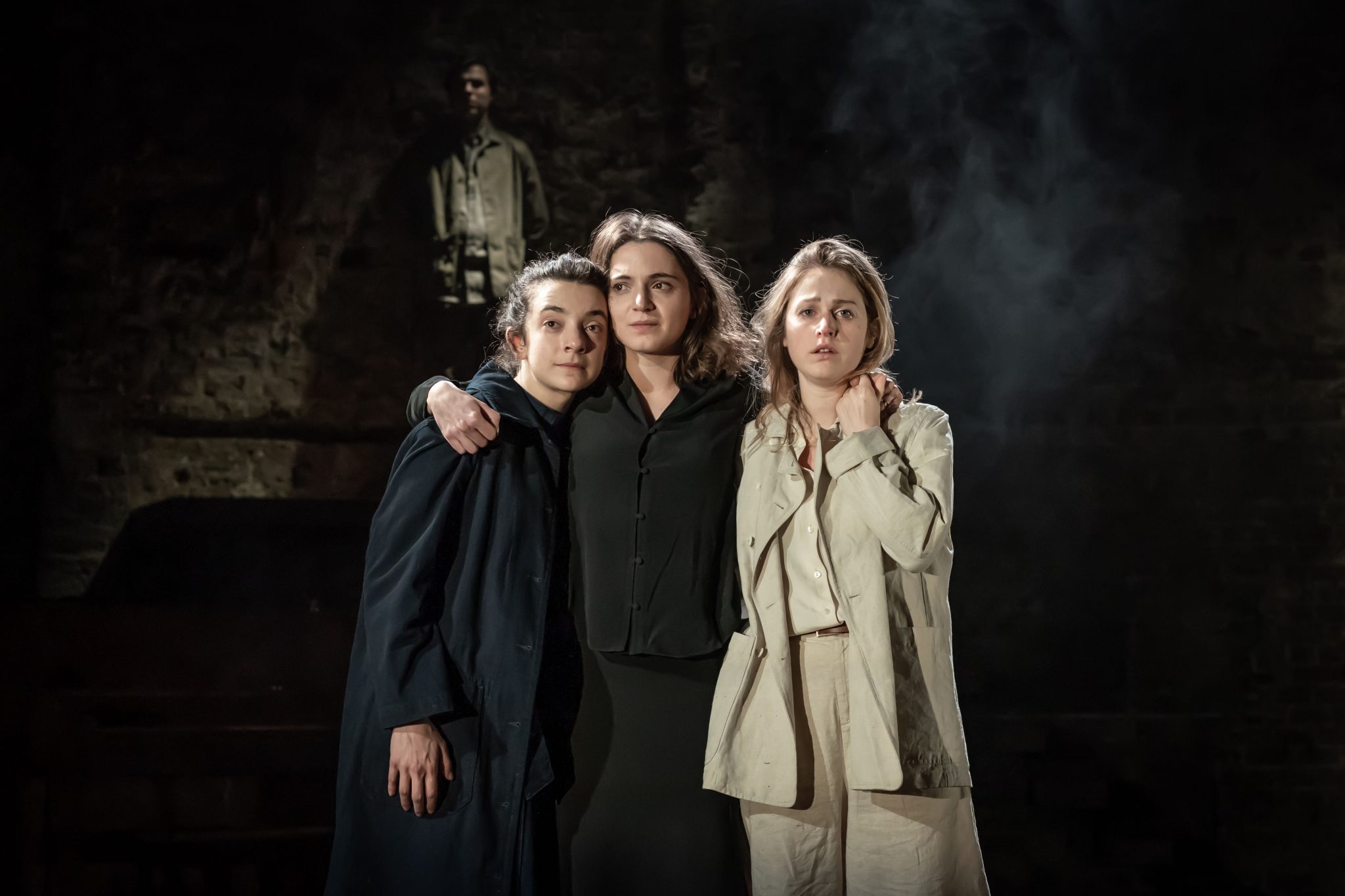Much like during his lifetime, the name Anton Chekov has the power to both excite and intimidate. A formidable figure in the literary world, Chekov’s role in bringing modernism to the stage allowed for the bleak reality of mankind’s existence to be fully realised – in a way that had no time for dramatics, only realism. In Cordelia Lynn’s rewriting of his play Three Sisters, we see Chekov’s vision honoured in an arduous yet evocative 175-minute long production.
Lynn’s adaptation, directed by Rebecca Frecknall, preserves the essence of Chekov’s original play: the time period in which the play was set remains the same, with the three sisters still attended to by the Russian brigade of soldiers their father used to have ties to. Hildegard Bechtler’s design is stripped back, allowing for the bare brick walls of the Almeida to reflect the minimal existence of this Russian community. The yellow lightbulbs that brighten the space give a warm glow that symbolises the strong ties this group of individuals have with one another, despite the unusual circumstances they find themselves living in.
All of these elements create the microcosmic existence the three sisters Olga, Masha and Irina have found themselves trapped within; following the death of their father, they are supported by those who loved him yet long to be elsewhere. Their dependency on one another and the soldiers who visit them subtly highlights the unstable situation these three young women have found themselves in; in spite of their education and sheltered upbringing, they must all rely on the men around them.
In spite of their shared grief, there is some fight in the young women at first. Of the three sisters, young Irina – played here by Ria Zmitrowicz – is full of aspirations and ambition. Keen to work, she also eagerly reminds her sisters of their plans to return to Moscow – which they left some 11 years before. Eldest sister, Olga (Patsy Ferran), too seems optimistic, masking any sense of doubt with an endless spew of insignificant insights. Although her talkative nature feels forced at times, her early musings are a clear distraction from her own sense of grief. The middle sister, Masha (Pearl Chanda), is not so amiable. Blunt and temperamental, she shares her grievances without any filter – taking out her frustration on whoever is in her firing line. As amusing as some of her takedowns are, Chanda’s inflection remains the same throughout the production and her diatribes become repetitive and annoying.
This constant unhappiness expressed by Masha characterises Three Sisters, for as time goes on, the sisters fail to make any progress with their plans. Irina’s youthful spirit is dampened by their remaining in the barracks, while Olga has to carry the burden of seeing her siblings waste their lives away. One character not yet mentioned is the fourth Sergeyevna sibling, Andrey (Freddie Meredith), who is idolised by his sisters yet quickly proves himself to be a disappointment. His gambling addiction and overbearing wife bring tension to a house that was once filled with laughter and musicians – which are yearned for as the play progresses.
What is striking about the production is its stagnancy. Confined to the house, the action onstage is for the most part idle, with the characters appearing on stage to vent about their failed attempts at happiness. The only real drama comes with the deafening transitional music signalling time lapses, which does not fit in with the melancholic stillness of the production. Thankfully, there is a fair amount of humour injected in the play through the characters of Masha’s husband Fyodor (Elliot Levey) and Ferapont (Eric MacLennan). Levey’s character in particular reveals the damaging effect of the three women on those around them, as he is constantly humiliated by his wife’s loathing for him.
Overall, what makes this production of Three Sisters so evocative and absorbing is the atmosphere that the actors have created. Despite relentless feelings of unfulfilment and melancholy expressed by the characters, you continue to sympathise with them. The siblings’ suffering is so palpable – their desperation to be happy so great – that the production feels aggressively heart-breaking. Of the four leading actors, it is Zmitrowicz’ performance as Irina that is the most difficult to watch, as the once wide-eyed young woman becomes devoid of all feeling and hope for the future.
Each holding off tears throughout the majority of the production, these three young women are admirable in their endeavour to do Chekov’s work justice. Gruelling for both the audience and actors, Three Sisters is a difficult show to perform successfully and this version is a fine effort.
